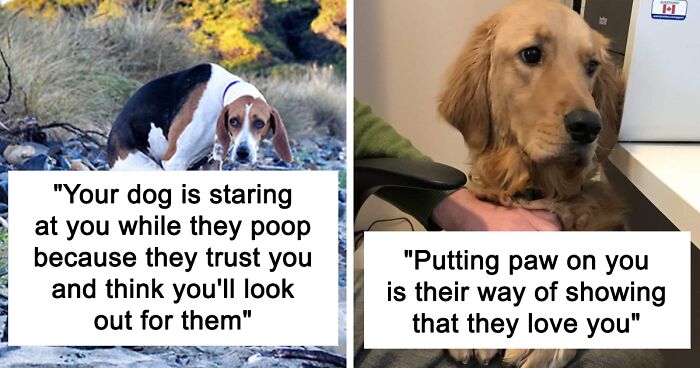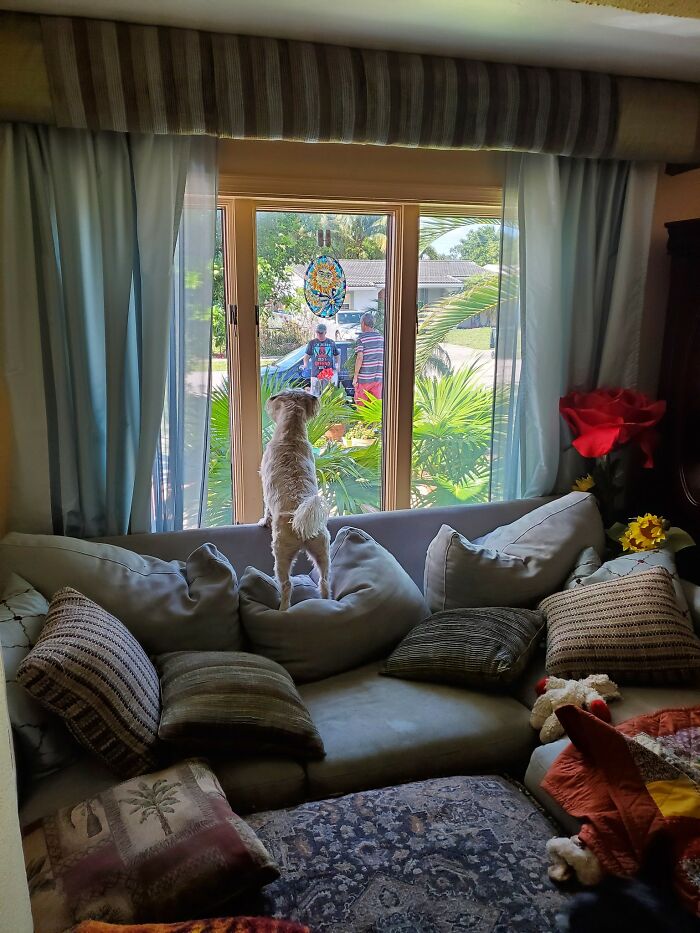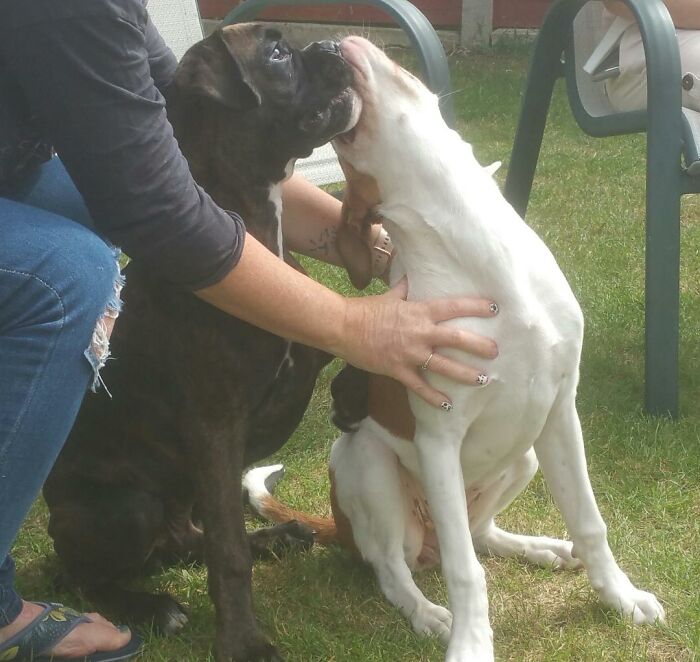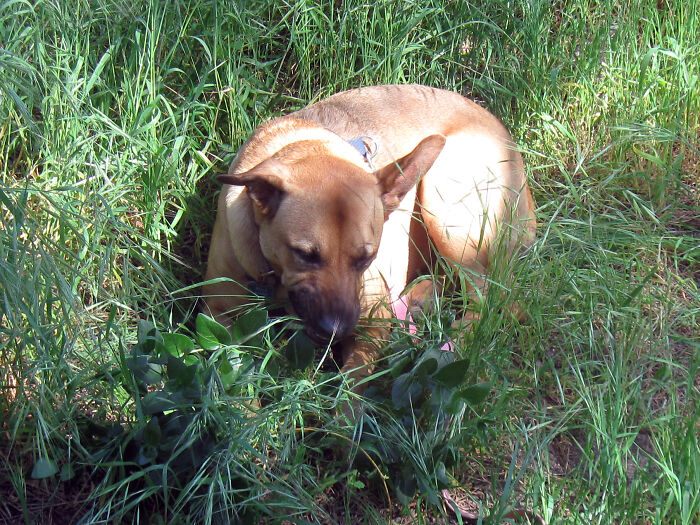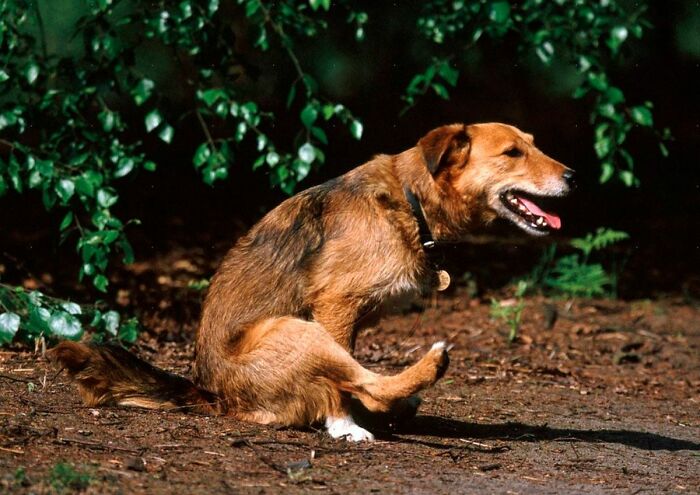You probably remember the TikTok creator Knowledgesaurus, who won the hearts of the internet by sharing a bunch of intriguing facts, myths, hacks and knowledge bites. You can check out our previous article on his awesome body facts right here.
Meanwhile, with 1.9M followers, his audience is ever-growing, and you can totally see why! This time, Knowledgesaurus is back on Bored Panda with something that would make any dog owner excited.
Please take your notes, everyone: thanks to the widely popular TikToker, we’re about to finally find out why our goodest bois and bestest girls stare at us while doing their business, and that one year of human life sadly is 7 times more in a dog’s life. And much more!
So I leave the stage to Knowledgesaurus’s awesome bio class on dog facts and myths we all wish we'd known before.

Image credits: knowledgesaurus
This post may include affiliate links.
Fact: Putting Paw On You
Whenever your dog puts their paw on you like this, it's their way of showing that they love you and it's their way of petting you.
With so many common dog myths surfing around and people genuinely believing in them, Bored Panda reached out to Dr. Jerry Klein, American Kennel Club’s Chief Veterinary Officer, who debunked some of the most widespread beliefs.
“Most people think they know their dog's health by judging the regular behavior like activity level and appetite, but most dog owners do not really detect many of their dog's medical issues until they become more significant problems,” Dr. Klein told us. However, “Conditions like dental disease and ear infections eventually present to veterinarians because most owners don't closely examine their dogs’ mouths and ears.”
Yearly wellness exams by a veterinarian are crucial to your dog's health, urged Dr. Klein, “because they will detect things like subtle weight fluctuations, which could be a clue to underlying disease, new heart murmurs that have developed, and intervene before more serious disease occurs.”
Fact: Staring At You While They Do Their Business
Your dog is staring at you while they poop because they trust you and think you'll look out for them while they're vulnerable while they're doing their business.
Fact: They Know Your Routine
Your dog actually knows your routine. If you have a pretty normal routine, your dog can tell when you're coming home based off of the amount of your scent left in the house.
Years ago a little dog we had was extremely attached to my dad. He had had a stroke, but could still drive but took the backroads. He went to the Legion on Thursday nights to play darts. He would never leave there at the same time. It would depend on how his games went. But even with that she knew when daddy was coming home. She would get up and go to the door to wait for him. Never the same time on any given evening. He would get home about 20 minutes after she went to the door. One night she got up and went to the door to wait. It wasn't very long before she turned and went back to her bed. She laid there for about 15 minutes and then got up and went back to the door to wait. As usual, about 20 minutes later he arrived home. My mom asked him if he left the Legion right after his games were finished. He said he had. However, when he went to leave he met a friend he stopped and talked to for about 15 minutes and then he left. Home 20 minutes later. Its more than knowing our routine.
And when it comes to popular myths, Dr. Klein busted a couple of very widespread ones. You've probably heard of people saying that dogs age seven years for every one human year. Turns out, it’s actually false! Dr. Klein said that this myth has been around for so long that most people see it as a fact.
“Although dogs do age quicker than humans, the 7:1 ratio is not perfectly accurate. Dogs age faster when they are younger and then the aging process slows down as they get older. The size of the dog also plays a role in the aging process—larger dogs age faster than small dogs.”
Another common myth is that a warm nose on a dog indicates sickness. Dr. Klein explained how it's false: “The idea that a dog in good health should have a cold, wet nose is nothing more than another myth. The temperature of a dog’s nose does not represent his health or sickness. Using a thermometer is the only way to accurately measure your dog’s temperature.”
Fact: Dogs Can Get Jealous
On the flipside, dogs can feel jealousy. Any time you're giving attention to another dog, treats, petting, your dog can feel jealous.
Myth: 1 Human Year = 7 Dog Years
That 1 human year equals 7 dog years. The first year of a dog's life is usually about 12 to 15 human years, the second is usually 9 to 10, and the rest after that are usually about 4 to 5. It depends on the dog's weight, breed and other things
Myth: Dogs Eat Grass When They're Sick
That dogs eat grass because they're sick. And while this can be true, a lot of dogs do this out of boredom or they just think it's fun to eat grass.
It's also theorized that it dates back to their wolf ancestors. Wolves will eat an entire animal, including the stomach contents. Since most of their prey are herbivores, this means plant material. It is suggested that some nutrients from the plants are needed, and that dogs are simply supplementing their diet this way.
If you assume that old dogs can’t learn new tricks, we have to tell you it’s false! “We have all heard the expression 'you can’t teach an old dog new tricks' at some point in our lives,” Dr. Klein said, but assured us that “you can absolutely teach old dogs new tricks; like how to shake hands, speak or roll over.” The chief veterinary officer at AKC added that “Keeping the training sessions short, fun and using plenty of positive reinforcement like treats and praise can help make the training process easier.”
“At one point in time, it was believed that dogs can only see in black, white and shades of grey, and this myth happens to still be believed by many people today. Dogs have fewer color-sensitive cones in their eyes than humans do.” However, Dr. Klein explained that “it has been discovered that, although not in the same way as humans, dogs can in fact see color. They can see blue, greenish yellow, and yellow along with various shades of grey.”
A wagging tail means a happy dog is probably one of the most common myths we hear too often! But Dr. Klein has busted this one too. “A wagging tail does not always mean the dog is happy,” he said and explained: “While, a natural, mid-level wagging tail does indicate contentedness, most other wags indicate the opposite. A high, stiff wagging tail can be a sign of agitation in the dog, suggesting that he is ready to protect something, while a low and quick wag may express that the dog is scared and submissive,” he concluded.
Myth: Dogs See In Black & White
That dogs see in black and white. Dogs lack some light receptors in their eyes to see colors, but they can see on a yellow-blue scale and this is what it would look like in their vision versus ours.
When we were on vacation in Florida, we brought our little dog with us. My dad was wearing a yellow bathing suit. He went to our room and was gone for a bit. Then a gentleman in a yellow bathing suit came down the stairs to the beach. Our dog went running over thinking it was my dad. When she got to him what a shock for her. Barking and running back to us. "That's not daddy!"
We also spoke to Alyssa Mages, the chief visionary officer at “Empowering Veterinary Teams,” who said that the majority of pet parents really do know their pets well as they've been with them every day, sometimes since puppyhood. “In my experience as a CVT, I would refer to this exact phenomenon telling owners that I only see a single instant of how their pet is, while they see a more in depth, long-term presentation,” she said. “Both of which are essential when they come into the hospital—for either an acute or emergent concern where my or a veterinarian's expertise comes to the forefront vs. updates on a chronic condition that can vary and present differently from day to day.”
When asked about the common dog myths, Alyssa said that the majority of these have already been debunked—“their mouths aren't cleaner, they do see in color, their age, etc.—but I think that there is one that remains, that myth of the 'perfect' breed of dog. This simply doesn't exist!”
She continued: “There are unicorns of every breed, and we cannot forget our mixed breeds, those loveable mutts are simply the best! What does exist is the perfect pairing—you'll know the best dog for you when you meet each other. The energies will blend, the body languages will match, and everyone wins.”
Fact: Scooting Their Butt
When your dog is scootin' his butt across the floor like this, he's not just trying to make you laugh. This is almost a sure sign of plugged or infected anal glands, which can collect fluid and can actually be drained manually, or they might be given something for it.
It may also need they have parasites. Basically, this is a dog scratching his butt, so anything that leads to itching in that area may cause the scooting.
Myth: A Dog's Mouth Is Cleaner Than A Humans
That a dog's mouth is cleaner than a human's. And this myth started when dogs licked their wound, they were seen to heal quicker, but that wasn't because they're cleaner, it was because of the blood flow from licking it. So dogs' mouths are dirtier and this is probably why your vet tells you not to let your dog kiss your face.
just knowing that the dog licks it's own nethers and eats cat turds, made me call bullshit on that one at a young age
Fact: Dogs Can't Feel Guilt
Even though your dog may look guilty, dogs cannot feel guilt.
Fact: dogs can be lovely companions that will cherish you and try to con a bite of your sandwich because they too like sandwiches and sharing is caring to them.
Pretty sure dog owners know all these, maybe a little unsure about the grass thing just like the poster.
One of mine will stop at the exact same spot for a little munch of grass before he moves on, he never pukes it back up, he just likes this particular patch of grass that we walk past.
Load More Replies...Fact: dogs can be lovely companions that will cherish you and try to con a bite of your sandwich because they too like sandwiches and sharing is caring to them.
Pretty sure dog owners know all these, maybe a little unsure about the grass thing just like the poster.
One of mine will stop at the exact same spot for a little munch of grass before he moves on, he never pukes it back up, he just likes this particular patch of grass that we walk past.
Load More Replies...
 Dark Mode
Dark Mode 

 No fees, cancel anytime
No fees, cancel anytime 






